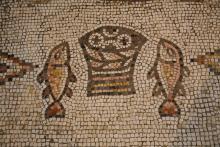Bible


From almost the beginning to the very end of the Book of Genesis, one theme whirls through many variations: war and peace between brothers (and one pair of sisters).
The book that later church writers named The Acts of the Apostles might just as well have been described as Luke's second book about the things Jesus did and taught through the Holy Spirit.
It's all too easy to make fun of the extreme examples of prophecy belief that we encounter on bumper stickers and best-seller lists.

The Hebrew Bible's vision of Sabbath economics contends that a theology of abundant grace and a communal ethic of redistribution is the only way out of our slavery to the debt system, with its theology of meritocracy and private ethic of wealth concentration. The contemporary church, however, has difficulty hearing this as good news since our theological imaginations have long been captive to the market-driven orthodoxies of modern capitalism.
Our fears have persuaded us that the biblical Jubilee is at best utopian and at worst communistic. Yet we find it awkward simply to dismiss the biblical witness, so an alternative objection inevitably arises, as if on cue: "Israel never really practiced the Jubilee!" If genuine, and not simply a strategy of avoidance, this challenge is best addressed by considering both the "negative" and "positive" evidence.
By "negative" evidence I mean the fact that Israel's prophets repeatedly and relentlessly criticized the nation's leadership for betraying the poor and vulnerable members of the community. This strongly suggests that the Sabbath vision of social and economic justice remained a measuring stick to which they could publicly appeal.
There can be no question that the Sabbath disciplines of seventh-year debt release and Jubilee restructuring were regularly abandoned by those Israelites who wished to consolidate social advantages they had gained. The historical narratives in the Hebrew Bible indicate that as the tribal confederacy was eclipsed by centralized political power under the Davidic dynasty, economic stratification followed inexorably. Indeed, the prophet Samuel warned that a monarchy would be linked intrinsically to an economy geared to the elite through ruthless policies of surplus-extraction and militarism (1 Samuel 8:11-18).
Genuine faith is never a private matter, something hidden away in one’s mind and spirit.

THE EXPERIENCE is a familiar one. A small, struggling community of believers searching for truth and justice finds the Spirit present in its midst. They are set aflame with the joy and peace of deep insight into God's call for them and for the church as a whole. They rush to their sisters and brothers in the larger church, offering the gift of their new revelation. But instead of open acceptance, they hit the brick wall of institutional rejection. Rather than being embraced, they are ignored.
If they insist on their version of truth, the reaction stiffens into anger, hatred, persecution. Eventually, they must decide: Do we in turn reject the institutional church in favor of our own Spirit-filled vision of justice and peace? Or do we continue to witness to the religious powers, no matter what the price?
